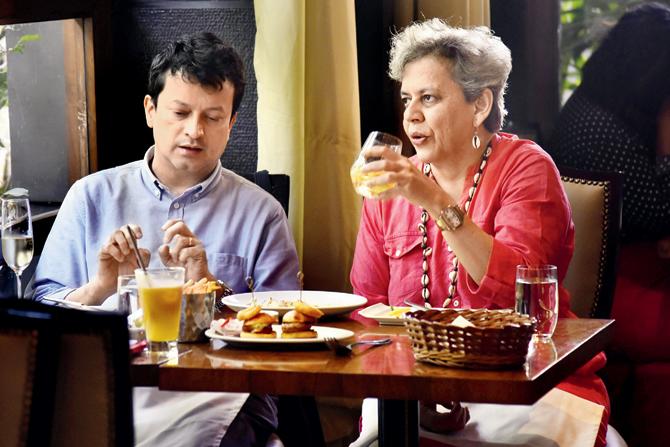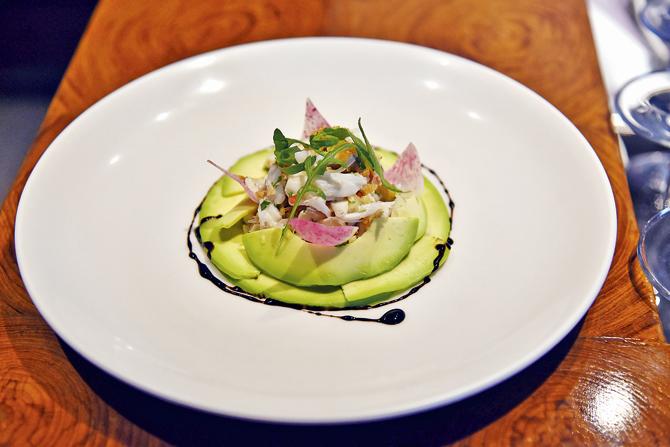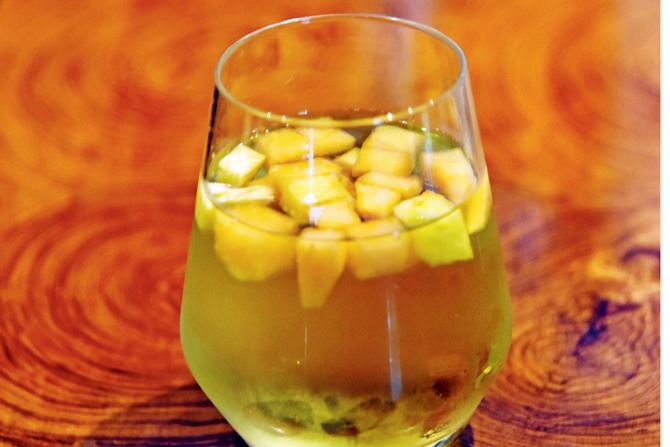When two stalwarts of the city's arts scene meet, the conversation is a peek into all that Mumbai is and can be. Brinda Miller and Ranjit Hoskote on keeping art inclusive, making it a part of everyday life, and cultural freedom


On the dot at 1 o' clock for this edition of Lunchbox, poet, cultural theorist and curator Ranjit Hoskote has already infused his day with art as he walks into The Table in Colaba after viewing a solo show of paintings at a gallery across the street. Brinda Miller, who joins us a couple of minutes later, has her greetings brimming with apologies for not being on time — something most Mumbaikars would seldom consider late. Punctuality, however, isn't the only virtue that the artist and noted advocate of public art has in common with Hoskote.
ADVERTISEMENT

Miller's session with art awaits her after lunch, when she heads for a meeting to the nearby Chhatrapati Shivaji Maharaj Vastu Sangrahalaya, where she shares her expertise as an education consultant. Both have recently stepped back from their roles in a much-loved arts festival to let younger, newer minds take over. While Miller recently exhibited Vanishing Point, her new series of paintings, Hoskote had the release of his book of poems, Jonahwhale, the previous day. Over another shared love for good food, the conversation that follows reflects on what art can do for Mumbai when it gets its due.

Snigdha: Your newest art is inspired by Mumbai's architecture, and Marine Drive finds a mention in Jonahwhale. How does the city find its way into your work?
Brinda: We not only work with Mumbai, we also work...
Ranjit: For Mumbai
Brinda: For Mumbai. That's why we are so inspired!
Ranjit: There's a strong sense of responsibility to the city and to culture, which tends to get seen as an optional extra. But if you don't pay attention to a city's culture, what happens to it? We keep talking about the spirit of the city, but it's got to be sustained.

Snigdha: Is the city finally opening up to more art-friendly eco-systems?
Brinda: I think it is. The exhibition at Sassoon Docks created quite a stir. It was wonderful to have a show like India and the World at CSMVS, with many people [coming to view it]. When I landed at the international airport yesterday, there were people from Delhi who were seeing T2 for the first time [and they were amazed]. People have seen that work (Miller has been instrumental in creating as well as selecting artworks for the airport) more than the viewers for all my exhibitions put together (laughs). But maybe things should move faster.
Ranjit: Art also needs to be fully allied with the kind of citizen movements we have in the city. For instance, a key crisis right now is the Mahim Nature Park, and the campaign associated with it is important. So, I wouldn't set art in some kind of a bubble of its own.

Snigdha: Does bringing art into the public sphere make keeping its essence intact difficult?
Ranjit: Whether its poetry, the visual arts or any other domain, you have to have a feedback mechanism. On the one hand, you sustain and allow for expression but on the other, you also have to have a critical, healthy appraisal.
Brinda: With any form of art, you first create awareness and then fine-tune it.
Snigdha: Has the fabric of Kala Ghoda, the city's art district, changed?
Brinda: When Samovar closed down, we couldn't do anything about it, and it was the same with Rhythm House. However, the old charm is still there and at the same time, it's become a happening place. Restaurants always make a place what it is.
Ranjit: I have mixed feelings about it. I remember there were some particularly tough years when there was a sense that the district had gone to sleep. Now there is this incredible renewal. While we all want urban renewal, you wonder if these are the so-called creative industries or gentrification. We know how this works — the artists move in first, then progressively, it shifts to something else and before you know it, the whole area is gentrified. Having said that, it's marvellous to be in a place where you have a vibrant public culture — restaurants, galleries, designer stores. Can we balance that off with a cultural system that's inclusive of different classes? That's the question I would pose.
Crab royale, avocado toast and spiced lamb mini burgers arrive.
Snigdha: Is food when served this way an art?
Brinda: Food was actually introduced at the festival, too, though there was a little resistance initially. We even came out with a book, which had a recipe each from all the restaurants in Kala Ghoda. You will be amazed to know that a lot of artists are good cooks because it's creative. I love to put things together and see how they work when I cook.
Ranjit: When we are curating things at the NGMA or CSMVS, it is a very particular experience at the end of a long day to have a vada pav from this place near the bus station outside the museum. What is available in this quarter is an amazing range of food. It becomes a little microcosm of the city.
Snigdha: Is cultural freedom under threat?
Brinda: It's become very difficult. There are so many good programmes that come our way but we just can't have them because we don't want any controversy.
Ranjit: In the public sphere, there is an ever-present feeling that cultural freedom is at risk. It works at the level of the individual artiste. And the real tragedy is when you begin to censor yourself.
 Subscribe today by clicking the link and stay updated with the latest news!" Click here!
Subscribe today by clicking the link and stay updated with the latest news!" Click here!







